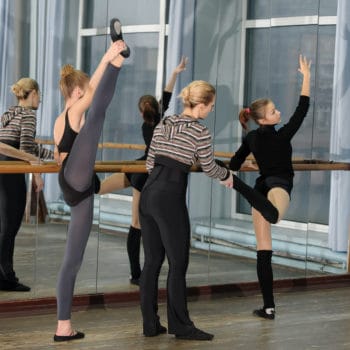Why We Love It
-
$76,710Potential Avg. Salary
-
10.8%Job Growth Rate
-
Growing DemandJob Outlook
-
Flexible HoursCareer Attribute
Music professors teach college courses in disciplines related to music, including voice, instruments, music appreciation, theory, and performance. They may teach broad, introductory courses or advanced, highly specific courses. They create syllabi, lead courses, and grade assignments and performances.
Recommended Schools
What is a Music Professor?
The following job responsibilities are common for individuals in music professor roles:
- Teach college courses in disciplines related to music
- Create course syllabi and lesson plans
- Grade student assignments and performances
- Perform a variety of administrative tasks in support of the music department
- Coordinate or assist with college musical performances
A Day in the Life of a Music Professor
The primary responsibility of a music professor is to teach music-related courses at colleges and universities. Music professors may teach introductory music courses like music appreciation, or they may teach higher-level courses on very specific music disciplines. For example, a music professor may teach advanced voice courses in opera, advanced instrument courses in guitar or piano, or advanced performance courses like musical theater. Professors may also specialize in a specific discipline and teach only courses related to that discipline.
In addition to teaching courses, music professors must plan coursework and grade student assignments. Music professors may suggest new courses to department leadership, create the syllabi for courses they’re scheduled to teach, and create lesson plans for upcoming classes. They also design and grade student assignments and submit final grades for students at the end of a semester. Music professors commonly spend more time in a week preparing for courses than actually teaching them.
Most music professors have additional responsibilities outside of the classroom. They may have to work on college committees, serve as student advisors, and volunteer to lead school musical performances. Additionally, music professors are often required to practice what they teach, and may be required to publish research in scholarly journals or perform in musical acts when not teaching. These activities help professors become tenured or qualify for promotions to more senior-level professor positions.
Typical Work Schedule for Music Professors
The work schedule for music professors can vary greatly depending on employer and level of courses taught. Some colleges cater to undergraduate students and offer courses primarily during the week during normal business hours. Other colleges cater to working students or graduate students and offer courses in the evening or on weekends. Additionally, even music professors who teach during the day often work in the evening or on the weekend to prepare for upcoming courses.
Projected Job Growth for Music Professors
Demand for professors of all types is expected to grow significantly in the coming decade as higher education becomes more accessible and more unavoidable. With most employers now requiring employees to hold college degrees, the demand for professors is expected to grow to meet increased interest in postsecondary education.
Career Progression
- Early Career: Singer, Musician, Band Instructor, Adjunct Music Instructor
- Mid-Career: Assistant Music Professor, Associate Music Professor
- Late Career: Music Professor, Assistant Dean, Dean
Typical Employers
Music professors are hired by colleges and universities to work in schools with music departments and music degree programs.
Recommended Schools
How To Become a Music Professor
The first step in becoming a music professor is to earn a bachelor’s degree in a related discipline. Students commonly pursue one of the following degree types: a bachelor of arts in music, a bachelor of music, or a bachelor of fine arts in music. Within each degree, the student will have the opportunity to specialize in a specific musical niche, such as singing, songwriting, an instrument, or performance. The focus is not important but will likely become your teaching specialization when you become a professor.
The next step is to earn a master’s degree. Again, students can choose between a master of arts, master of music, or master of fine arts, and again you’ll likely need to choose a specialization. Performing in your field will be important during this time, as will finding adjunct music instructor positions or graduate assistantships that allow you to gain teaching experience. Many graduate courses allow students to pay for their college by teaching introductory music courses at the school, and this experience provides students with teaching experience that is crucial for finding work as a professor.
While some aspiring music professors are able to find full-time work as a music professor with only a master’s degree, most colleges require professors to also have a Ph.D. or doctor of musical arts. With a doctoral degree, students can begin applying for tenure-track music professor roles. After working in a tenure-track position for several years, you’ll be able to apply for tenure to work your way into assistant, associate, and full professor roles over the course of your career.
Music Professor Salary Data
We’ve provided you the following to learn more about this career. The salary and growth data on this page comes from recently published Bureau of Labor Statistics data while the recommendations and editorial content are based on our research.
National Anual Salary
Low Range
$47,120Average
$76,710High Range
$129,150National Hourly Wage
Low Range
---Average
---High Range
---How do Music Professor salaries stack up to other jobs across the country? Based on the latest jobs data nationwide, Music Professor's can make an average annual salary of $76,710, or --- per hour. On the lower end, they can make $47,120 or --- per hour, perhaps when just starting out or based on the state you live in.
Salary Rankings And Facts
#160 Nationally for All Careers
Above Average Salary Nationally
Programs and Degrees
Here are the most common degrees for becoming a Music Professor. a is usually recommended and specifically a degree or coursework that prepares you for the particular field, see below.
Highest Education Among Music Professors
- 43.3% Doctorate
- 35.7% Masters
- 16.2% Bachelors
- 2% Associates
- 2.4% College
- 0.2% High School
- 0.2% Less than High School
Job Growth Projections and Forecast
2014 Total Jobs
120,7002024 Est. Jobs
133,700Job Growth Rate
10.8%Est. New Jobs
13,000How does Music Professor job growth stack up to other jobs across the country? By 2024, there will be a change of 13,000 jobs for a total of 133,700 people employed in the career nationwide. This is a 10.8% change in growth over the next ten years, giving the career a growth rate nationwide of Above Average.
Growth Rankings And Facts
#169 Nationally for All Careers
Above Avg. Growth Nationally
What Companies Employ The Most Music Professors
| Industry | Current Jobs | New Jobs Needed | % Increase |
|---|---|---|---|
| Colleges, universities, and professional schools; private | 56,000 | 7,600 | 8% |
| Colleges, universities, and professional schools; state | 36,400 | 1,400 | 1% |
| Junior colleges; local | 13,900 | 1,900 | 2% |















